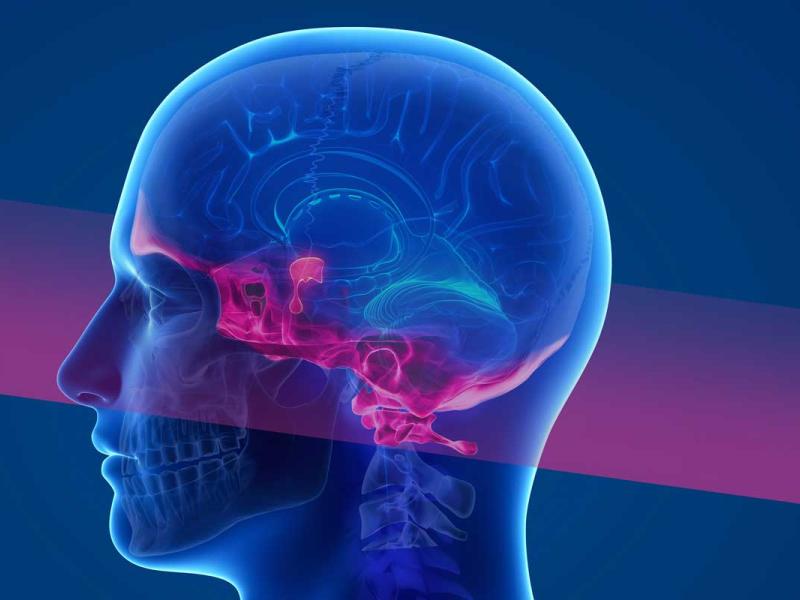Tumors Affecting Skull Base and Pituitary Gland
The Skull Base Surgery Team at Penn State Health Milton S. Hershey Medical Center is committed to providing the best care for patients with pituitary and skull base tumors. This multidisciplinary team includes neurosurgery, otolaryngology (ear, nose and throat, or ENT), ophthalmology, plastic surgery, radiation oncology and medical oncology. Our team is active in research and innovation to advance treatments of skull base disease while preserving patients’ quality of life.
Skull base and pituitary tumors can cause a wide range of serious health problems, some of which can be life-threatening. Critical structures like blood vessels and cranial nerves found along the skull base are essential to:
- Balance
- Facial movement
- Hearing
- Speech
- Swallowing
- Vision
These symptoms typically indicate an issue in the skull base area, and your physician will order a CT scan or MRI to help diagnose the problem. Your physician can connect you with an ophthalmologist, otolaryngologist, neurologist or neurosurgeon depending on your symptoms. Our experts are here to help diagnose and treat your condition at our specialized Penn State Health Skull Base and Pituitary Center.
Skull base and pituitary tumors can have severe and life-threatening symptoms for both cancerous and non-cancerous tumors. Even non-cancerous tumors can continue to grow and affect vision, balance and more. Our Penn State Health Skull Base team is experienced, skilled and committed to your health, safety and well-being. We will work closely with you to determine the best treatment plan and provide support services before, during and after treatment.
Our team has advanced skills in both minimally invasive, endoscopic and traditional approaches to the entire anterior and lateral skull base. Many tumors can be accessed entirely through the nose, resulting in minimal scarring and faster recovery. In some patients, Gamma Knife radiosurgery offers an effective treatment with no surgical incision. Members of the Skull Base Surgery team meet regularly to discuss the best treatment plans, new research and trials for treating this complex disease, along with improving the organizational process for patients.
Symptoms, Diagnosis and Outlook
Skull base and pituitary tumors symptoms can be difficult to pinpoint; however, make an appointment with your primary care physician if you are experiencing any of the following symptoms:
- Clear, watery drainage from the nose
- Constant headaches
- Decreasing vision
- Growing feet or hands as an adult (rings or shoes no longer fit)
- Nasal obstruction
- Neurologic changes
- Newly diagnosed diabetes
- Purple stretch marks
- Sudden weight gain without a change in diet or lifestyle
- Woman lactating that is not associated with pregnancy
These symptoms typically indicate an issue in the skull base area, and your physician will order a CT scan or MRI to help diagnose the problem. Your physician can connect you with an ophthalmologist, otolaryngologist, neurologist or neurosurgeon depending on your symptoms. Our experts are here to help diagnose and treat your condition at our specialized Penn State Health Skull Base and Pituitary Center.
Skull base and pituitary tumors can have severe and life-threatening symptoms for both cancerous and non-cancerous tumors. Even non-cancerous tumors can continue to grow and affect vision, balance and more. Our Penn State Health Skull Base team is experienced, skilled and committed to your health, safety and well-being. We will work closely with you to determine the best treatment plan and provide support services before, during and after treatment.
Experts in Care
Meet our doctors, view their profiles and select the one that’s right for you.
Find a doctor near youWhy Choose Penn State Health for Care
It is essential for skull base lesions to be treated in a multidisciplinary manner, with the best people and best technology in the best care environment. Our team provides both surgical care as well as the latest technology in Gamma Knife and radiation techniques.
The Penn State Health Skull Base team offers a comprehensive, interdisciplinary evaluation and discussion of all treatment options and then carries out the best treatment for each patient. To further enhance quality and outcomes, our team uses three-dimensional printed models and precise surgical planning as well as custom-engineered implants and plates for reconstruction when needed.
For pediatric patients, we have a comprehensive children’s hospital and dedicated pediatric skull base specialists who understand the unique needs of pediatric patients before, during and after treatment.
Cutting-Edge Skull Base Tumor Surgical Treatment Options
Skull base surgery is a highly specialized set of techniques to remove or repair lesions along this bony junction. This surgery, sometimes referred to as cranial base surgery, occurs at the skull base, which is the bone at the bottom of the brain cavity. The anterior skull base separates the nose and sinuses from the brain and spinal fluid. The lateral skull base separates the ear, hearing and balance organs from the brain and spinal fluid.
Many skull base tumors require surgical treatment, but in some cases nonsurgical treatments or radiation therapy are good options. Our team will provide information on all treatment options and work with you to make a shared decision on the best treatment plan for you. We offer Gamma Knife therapy for many skull base tumors as well as endoscopic surgery and traditional surgical options.
Pituitary Tumor (Adenoma) Surgical Options
Pituitary tumor surgery involves removing a tumor affecting the pituitary gland, which is located in the skull below the brain and above the nasal passages. As the “master gland,” it releases hormones that regulate various body functions and stimulates other glands to secrete hormones.
Most pituitary tumors (adenomas) are noncancerous but can cause significant health issues affecting the pituitary gland’s production. These tumors can also press on the optic nerve, leading to vision problems. Pituitary tumors cause a wide range of symptoms, including headaches, infertility, erectile dysfunction and mood changes. To confirm a diagnosis of a pituitary tumor, your physician will order hormone testing of the blood and urine. An MRI might also be used to help your physician get a more comprehensive look at your tumor.
The most common surgery for a pituitary tumor is called the transsphenoidal approach, done through the sphenoid sinus – a hollow space in the skull behind the nasal passages and below the brain. At Penn State Health Milton S. Hershey Medical Center, it is most commonly done with an endoscope (a thin tube with a tiny camera) inserted through the nose. This way, no part of the brain is touched, and there is no visible scar.
For larger tumors, other surgical methods may be used. Our surgeons are highly experienced in all the surgical approaches and make every effort to minimize risk while fully removing the tumor.
Comprehensive Skull Base and Pituitary Tumor Care
Some of the conditions we treat at the Penn State Health Skull Base and Pituitary Center include:
- Acoustic neuroma
- Cerebrospinal fluid leak
- Chordoma
- Craniopharyngioma
- Encephalocele
- Esthesioneuroblastoma (olfactory neuroblastoma)
- Glomus tumors
- Juvenile nasopharyngeal angiofibroma
- Meningioma
- Optic nerve compression
- Orbital tumors
- Pediatric skull base defects and tumor
- Pituitary tumor (adenoma)
- Rathke’s cleft cyst
- Schwannomas and neurofibromas
- Traumatic injury of the skull base
- Various sinonasal tumors
Penn State Health Skull Base and Pituitary Center
The Penn State Health Skull Base Center offers patients a highly functioning, multidisciplinary team of fellowship-trained physicians and surgeons. Our team meets regularly to discuss patient care plans and work together to provide advanced treatment options in a patient-centered approach. We are on the same campus to ensure continuity of care for our patients and often coordinate visits so patients can see multiple specialists on the same day. We also offer dedicated patient care space for adults who have skull base procedures. The Penn State Health Skull Base and Pituitary Center is proud to provide leading-edge technology for diagnosing, managing and surgically treating skull base lesions and pituitary tumors.
Learn about our multidisciplinary team, advanced surgical techniques, and personalized care plans designed to address complex conditions at the skull base.
Commitment to Clinical Trials
The Skull Base Surgery team at Penn State Health Milton S. Hershey Medical Center is committed to furthering pituitary and skull base tumor research. We are actively involved in clinical trials to research safe and effective treatment options that also preserve function and quality of life. To learn more about clinical trials available at Penn State Health, visit our StudyFinder.
Support Groups
Support groups provide an opportunity to share your feelings and connect with other patients and caregivers who are experiencing similar struggles.
Convenient Locations
Find the care your family needs, close to home, at one of our many locations throughout central Pennsylvania.
Find a location near you




